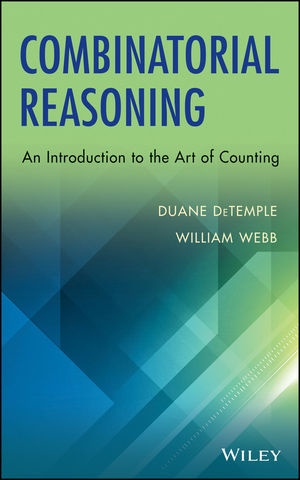Partager
Fr. 179.00
D Detemple, Duan DeTemple, Duane DeTemple, Duane (Washington State University DeTemple, Duane W. DeTemple, Duane Webb Detemple...
Combinatorial Reasoning - An Introduction to the Art of Counting
Anglais · Livre Relié
Expédition généralement dans un délai de 1 à 3 semaines (ne peut pas être livré de suite)
Description
Written by two well-known scholars in the field, Combinatorial Reasoning: An Introduction to the Art of Counting presents a clear and comprehensive introduction to the concepts and methodology of beginning combinatorics. Focusing on modern techniques and applications, the book develops a variety of effective approaches to solving counting problems.
Balancing abstract ideas with specific topical coverage, the book utilizes real world examples with problems ranging from basic calculations that are designed to develop fundamental concepts to more challenging exercises that allow for a deeper exploration of complex combinatorial situations. Simple cases are treated first before moving on to general and more advanced cases. Additional features of the book include:
* Approximately 700 carefully structured problems designed for readers at multiple levels, many with hints and/or short answers
* Numerous examples that illustrate problem solving using both combinatorial reasoning and sophisticated algorithmic methods
* A novel approach to the study of recurrence sequences, which simplifies many proofs and calculations
* Concrete examples and diagrams interspersed throughout to further aid comprehension of abstract concepts
* A chapter-by-chapter review to clarify the most crucial concepts covered
Combinatorial Reasoning: An Introduction to the Art of Counting is an excellent textbook for upper-undergraduate and beginning graduate-level courses on introductory combinatorics and discrete mathematics.
Table des matières
PREFACE ix
PART I THE BASICS OF ENUMERATIVE COMBINATORICS
1 Initial EnCOUNTers with Combinatorial Reasoning 3
1.1 Introduction, 3
1.2 The Pigeonhole Principle, 3
1.3 Tiling Chessboards with Dominoes, 13
1.4 Figurate Numbers, 18
1.5 Counting Tilings of Rectangles, 24
1.6 Addition and Multiplication Principles, 33
1.7 Summary and Additional Problems, 46
References, 50
2 Selections, Arrangements, and Distributions 51
2.1 Introduction, 51
2.2 Permutations and Combinations, 52
2.3 Combinatorial Models, 64
2.4 Permutations and Combinations with Repetitions, 77
2.5 Distributions to Distinct Recipients, 86
2.6 Circular Permutations and Derangements, 100
2.7 Summary and Additional Problems, 109
Reference, 112
3 Binomial Series and Generating Functions 113
3.1 Introduction, 113
3.2 The Binomial and Multinomial Theorems, 114
3.3 Newton's Binomial Series, 122
3.4 Ordinary Generating Functions, 131
3.5 Exponential Generating Functions, 147
3.6 Summary and Additional Problems, 163
References, 166
4 Alternating Sums, Inclusion-Exclusion Principle, Rook Polynomials, and Fibonacci Nim 167
4.1 Introduction, 167
4.2 Evaluating Alternating Sums with the DIE Method, 168
4.3 The Principle of Inclusion-Exclusion (PIE), 179
4.4 Rook Polynomials, 191
4.5 (Optional) Zeckendorf Representations and Fibonacci Nim, 202
4.6 Summary and Additional Problems, 207
References, 210
5 Recurrence Relations 211
5.1 Introduction, 211
5.2 The Fibonacci Recurrence Relation, 212
5.3 Second-Order Recurrence Relations, 222
5.4 Higher-Order Linear Homogeneous Recurrence Relations, 233
5.5 Nonhomogeneous Recurrence Relations, 247
5.6 Recurrence Relations and Generating Functions, 257
5.7 Summary and Additional Problems, 268
References, 273
6 Special Numbers 275
6.1 Introduction, 275
6.2 Stirling Numbers, 275
6.3 Harmonic Numbers, 296
6.4 Bernoulli Numbers, 306
6.5 Eulerian Numbers, 315
6.6 Partition Numbers, 323
6.7 Catalan Numbers, 335
6.8 Summary and Additional Problems, 345
References, 352
PART II TWO ADDITIONAL TOPICS IN ENUMERATION
7 Linear Spaces and Recurrence Sequences 355
7.1 Introduction, 355
7.2 Vector Spaces of Sequences, 356
7.3 Nonhomogeneous Recurrences and Systems of Recurrences, 367
7.4 Identities for Recurrence Sequences, 378
7.5 Summary and Additional Problems, 390
8 Counting with Symmetries 393
8.1 Introduction, 393
8.2 Algebraic Discoveries, 394
8.3 Burnside's Lemma, 407
8.4 The Cycle Index and P´olya's Method of Enumeration, 417
8.5 Summary and Additional Problems, 430
References, 432
PART III NOTATIONS INDEX, APPENDICES, AND SOLUTIONS TO SELECTED ODD PROBLEMS
Index of Notations 435
Appendix A Mathematical Induction 439
A.1 Principle of Mathematical Induction, 439
A.2 Principle of Strong Induction, 441
A.3 Well Ordering Principle, 442
Appendix B Searching the Online Encyclopedia of Integer Sequences (OEIS) 443
B.1 Searching a Sequence, 443
B.2 Searching an Array, 444
B.3 Other Searches, 444
B.4 Beginnings of OEIS, 444
Appendix C Gen
A propos de l'auteur
DUANE DETEMPLE, PHD, is Professor Emeritus in the Department of Mathematics at Washington State University (WSU). He is the recipient of the 2007 WSU Sahlin Faculty Excellence Award for Instruction as well as the Distinguished Teaching Award from the Pacific Northwest Section of the Mathematical Association of America.
WILLIAM WEBB, PHD, is Professor in the Department of Mathematics at Washington State University and President of the Fibonacci Association. His research interests include the properties of recurrence sequences and binomial coefficients. He is the author of numerous research publications on combinatorics, number theory, fair division, and cryptography.
Résumé
Written by two well-known scholars in the field, Combinatorial Reasoning: An Introduction to the Art of Counting presents a clear and comprehensive introduction to the concepts and methodology of beginning combinatorics.
Détails du produit
| Auteurs | D Detemple, Duan DeTemple, Duane DeTemple, Duane (Washington State University DeTemple, Duane W. DeTemple, Duane Webb Detemple, DeTemple Duane, William Webb, William (Washington State University Webb |
| Edition | Wiley, John and Sons Ltd |
| Langues | Anglais |
| Format d'édition | Livre Relié |
| Sortie | 25.04.2014 |
| EAN | 9781118652183 |
| ISBN | 978-1-118-65218-3 |
| Pages | 488 |
| Catégories |
Sciences naturelles, médecine, informatique, technique
> Mathématiques
> Autres
Mathematik, Informatik, Kombinatorik, Diskrete Mathematik, Mathematics, computer science, Combinatorics, Discrete Mathematics, Allg. Informatik |
Commentaires des clients
Aucune analyse n'a été rédigée sur cet article pour le moment. Sois le premier à donner ton avis et aide les autres utilisateurs à prendre leur décision d'achat.
Écris un commentaire
Super ou nul ? Donne ton propre avis.

